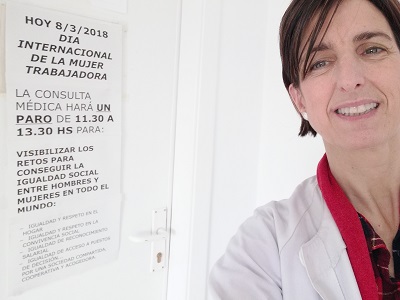From the President: April 2018
 Photo: The president at the Colombia conference
español français
Photo: The president at the Colombia conference
español français
Greetings to all. Since I last wrote I have seen sun, snow, the beginnings of spring in England, and some great work!
I have been to two regional conferences – the East Mediterranean Region congress, in Kuwait, and the IberoAmericana cumbre and conference, in Columbia - as well as visiting Algeria to attend a high level summit organised by the local member organisation. In Kuwait City, I visited the Al-Yamouk Clinic, which is sponsored by the local community, and runs multiple services with both clinical and societal activities.
This led me to thinking – again – about the role of family doctors in highlighting, challenging, and modifying the impacts of poverty and inequality. Another trigger for reflection on this theme was the escalating crisis in Syria, and the ongoing problems in Yemen: a number of members have discussed with me what kind of action WONCA can take to address these big problems. We issued a statement of concern about the situation in Eastern Ghouta, but this is not likely to alter the course of events.
As citizens we can ask politicians for action, or make donations for aid. As doctors we can raise awareness, and try to provide services that are really useful for our local communities, also partnering with others to address some of the causes of ill health – as I saw at al-Yamouk. Of course, this takes extra energy and staff time – in some health systems, time is allocated for clinical staff to carry out these more ‘population oriented’ activities, and some specific members of staff are given the task of community liaison. In other settings, where the system does not allocate populations to family doctors, it may be harder to identify specific partners – but I have seen in most clinics some key messages: for example about reducing sugary drinks and high calorie foods, or stopping smoking. So I think the public health role is embraced by most of us – and it is good to see how far we can prioritise this, as this is often where prevention can really start.
It is a different kind of intervention to work with migrants, displaced persons, and in conflict zones or areas of disaster. I have also become aware of the displacement of medical personnel caused by conflict, and the disruption to clinical services and their own careers under conditions of political instability. I want to offer the support of the WONCA community to all those who are affected in this way.
I was also interested in some of the actions taken by colleagues on International Women’s Day – including a short ‘strike’ during the working day which was explained to patients as aiming “to show the challenges in reaching social equality between men and women anywhere in the world:
- equality and respect in homes
- equality and respect in society
- equal payment recognition
- equal access to decision-making positions
all needed to create a shared, cooperative and welcoming society”.
Apparently the patients took this well and it caused ongoing discussion through the day!

Photo: Maria Pilar Astier-Peña, Chair of our Working Party on Quality and Safety with the poster explaining the Spanish strike to patients.
So the question for me this month is – what is a legitimate political action for professionals? Most of the time we try NOT to take sides, or to allow particular beliefs and values to affect our work with patients. We take a neutral position - make it clear when people’s actions are causing harm to themselves or others, but try to help them to change, and act supportively. Most of our day is spent answering requests for help, and a minority of time engaging with the ‘upstream’ causes of illness. But sometimes, for our own sakes and for others, it is right to speak out. Even if we cannot directly take an action that will change things, we feel more empowered by acting than staying silent. And if we ourselves are in the frontline, we also feel acknowledged by the support of others.
This is not party politics – it is the duty of professionals to speak out on behalf of others, and to speak up if conditions are undermining our work or the needs of our patients. Advocacy – again!
Amanda Howe
WONCA President.